The Indian election no one can afford to lose
The Indian election no one can afford to lose
- 11 February 2017
- India
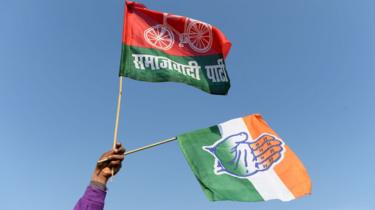 AFP
AFP
As the northern Indian state of Uttar Pradesh begins a seven-phase election on 11 February to choose a new government, the BBC's Geeta Pandey in the state capital, Lucknow, explains why these polls matter.
Why is Uttar Pradesh important?
The northern state is India's most populous, with more than 200 million people. If it were a separate country, it would be the fifth-largest by population in the world after China, India, the United States and Indonesia.
Commonly called UP, the state sends the largest number of MPs - 80 - to India's parliament. It is often said that the party that wins the state rules the country.
Several prime ministers, including India's first PM Jawaharlal Nehru, have come from here.
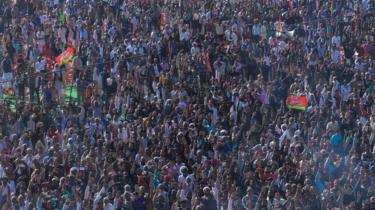 AFP
AFP
Prime Minister Narendra Modi, who is from the western state of Gujarat, also chose to make his parliamentary debut from the state in the 2014 general election when he contested from Varanasi.
And voters in the state can easily claim the credit for his Bharatiya Janata Party's (BJP) stunning sweep of the elections. Of the 282 seats they won, 71 were from Uttar Pradesh.
Who are the main players?
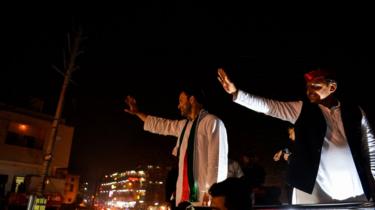 AFP
AFP
It's a three-way contest between the governing BJP, the regional Bahujan Samaj Party (BSP) and the state's ruling Samajwadi Party (SP), which is contesting the polls in alliance with the Congress.
Since the late 1990s, the Samajwadi Party and the Bahujan Samaj Party have dominated state politics, with the Congress and the BJP pushed to the sidelines.
But this time, buoyed by its success in the general election, the BJP is making a serious bid for victory. The party is yet to declare a chief ministerial candidate and is banking on the popularity and charisma of Prime Minister Narendra Modi to win the polls. Mr Modi has been criss-crossing the state, addressing election rallies and exhorting voters to give the BJP a chance.
The Samajwadi Party is led by 43-year-old Chief Minister Akhilesh Yadav. He led his party to victory in the 2012 state assembly polls and is hoping for an encore when the votes are counted on 11 March. His journey, however, has been far from smooth, especially in the past few weeks when he fought a very public battle with Mulayam Singh Yadav, his father and chief of the party.
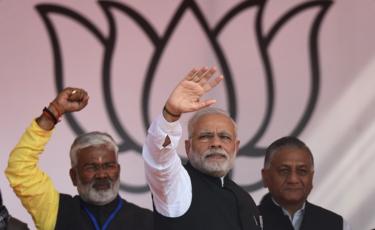 AFP
AFP
As father and son fought for power in a manner likened to political drama House of Cards, the party seemed on the verge of disintegrating. But Yadav junior won the duel, and has since forged an alliance with India's main opposition Congress party. The partners have been holding joint election rallies, promising good governance, state development and free smartphones for young people.
Pitted against the BJP and the SP-Congress alliance is the Bahujan Samaj Party, led by Dalit (formerly Untouchables) icon Ms Mayawati. The four-time state chief minister, who lost power in 2012, is seeking a comeback. She is hugely popular among her community, but during her earlier stints she was criticised for spending millions of dollars to build statues of herself and other Dalit icons. This time though, she has promised to not spend money on statues and says she will work to lift millions of people out of poverty.
What's at stake?
Because of its sheer size and numbers, UP is a key battleground. And for the parties in the fray, these elections are being seen as a do-or-die battle.
The BJP hasn't done too well in state polls since winning the 2014 general elections, so a victory here is important. Also, the polls are being seen as a referendum on Mr Modi's recent move to ban 500 and 1,000 rupee notes. The timing of the move has been questioned by many and if the party loses, a blame game is likely to begin.
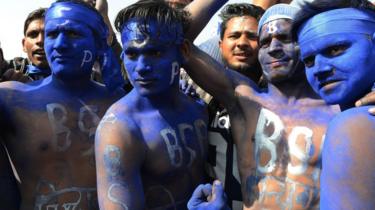 AFP
AFP
A victory for Akhilesh Yadav is crucial as it will cement his position as the leader of his party. If he loses, the rebel faction led by his uncle Shivpal Yadav will get a boost. A win will also bring cheer to the Congress, which has had little joy with voters in the general election or in regional polls for the last few years.
And a win is absolutely essential for Ms Mayawati, who has spent the past five years in the political wilderness. Analysts say if she loses this time too, she risks becoming politically irrelevant and may find it very difficult to bounce back.
How do the numbers look?
With 403 seats up for grabs, thousands of contestants are in the fray, fighting for a share of the pie.
More than 138 million voters will be casting their votes at 147,148 polling centres, watched over by thousands of police and paramilitary troops, during the seven phases of voting spread over a month.
Despite its political significance, UP remains among India's most backward states with millions living in extreme poverty, a lack of employment opportunities and rampant corruption.
For some voters the only tool they have to express themselves with is their vote. And during elections they come out in large numbers to use it - often against those in power.
Comments
Post a Comment